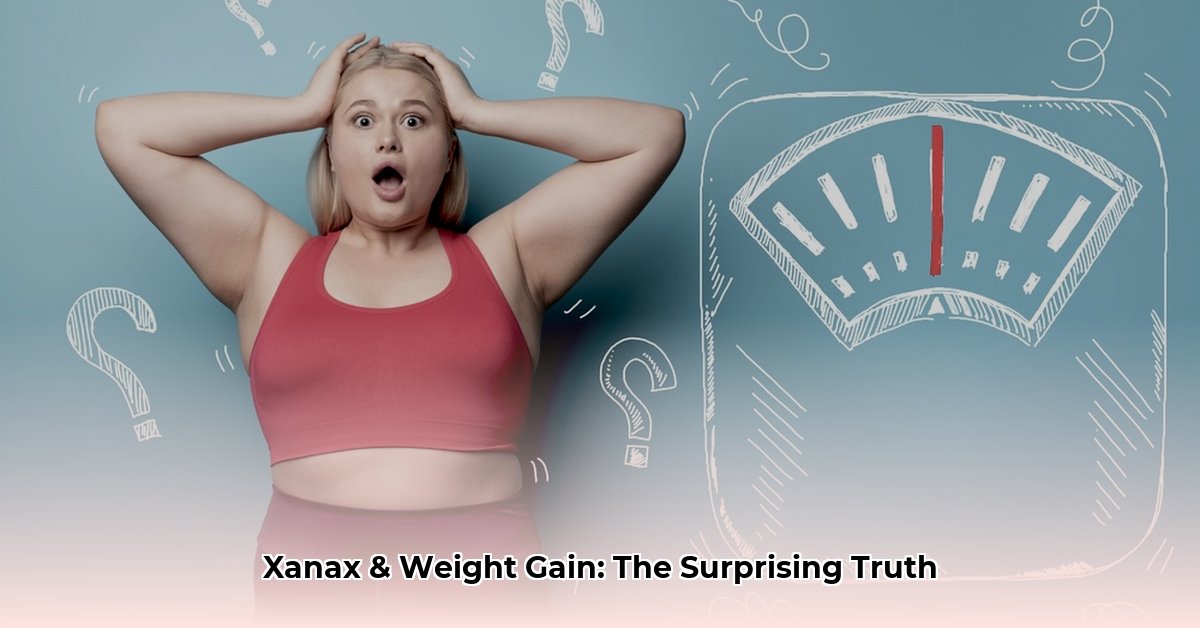Xanax is a commonly prescribed medication for anxiety and panic disorders. However, a frequent concern among those considering or taking it is the potential for weight gain. This comprehensive article addresses this concern, exploring the complex relationship between Xanax and weight, separating fact from fiction, and offering practical advice for managing your health.
Xanax and Weight: Understanding the Connection
While Xanax isn’t a direct cause of significant weight gain, it can subtly influence factors that contribute to weight fluctuations. This isn’t a simple cause-and-effect relationship; individual responses vary greatly. Some individuals may experience minor weight gain, others may lose weight, and many notice no change at all.
How Xanax Might Influence Weight
Several factors may contribute to weight changes while taking Xanax:
Appetite Changes
Xanax can affect appetite in different ways. Some people experience increased cravings, particularly for calorie-dense comfort foods, while others find their appetite suppressed. These changes likely relate to Xanax’s effect on neurotransmitters that regulate mood, anxiety, and appetite. A 2020 study suggests that certain benzodiazepine receptors in the brain may influence appetite regulation. More research is needed to fully understand this interplay.
Metabolic Rate
Some evidence suggests that Xanax may slightly slow down metabolism, potentially making it easier to gain weight. This effect is usually minimal and may be compounded by other factors like decreased activity levels. However, the research on this is not conclusive, and further studies are necessary to confirm this link.
Fluid Retention
Xanax can occasionally cause fluid retention, which might appear as weight gain on the scale. This is not true weight gain in terms of increased fat mass, but rather temporary water weight.
Reduced Activity Levels
The calming and sedative effects of Xanax might lead to decreased physical activity in some individuals. If you’re moving less, you’re burning fewer calories, which can contribute to weight gain over time.
Mood Changes
Xanax can sometimes worsen pre-existing depression or trigger depressive symptoms. Depression itself can influence both appetite and activity levels, indirectly contributing to weight changes.
Individual Factors and Weight Variation
It’s crucial to remember that everyone responds to medication differently. Your experience with Xanax and weight will be influenced by a combination of factors:
- Dosage: Higher doses might increase the likelihood of side effects, including weight changes.
- Metabolism: Your individual metabolic rate plays a key role in how your body processes medication and utilizes energy––and may also influence how susceptible you are to changes.
- Lifestyle: Diet, exercise, and sleep habits significantly impact weight management, regardless of medication.
- Underlying Conditions: Pre-existing health conditions, including anxiety and depression, can influence appetite and metabolism.
- Other Medications: Interactions with other medications can contribute to weight fluctuations.
Managing Your Health While Taking Xanax
If you’re concerned about weight changes while on Xanax, consult your doctor. They can help determine the cause of any fluctuations, adjust your dosage if necessary, or explore alternative medications. Never stop taking Xanax abruptly without consulting your doctor, as this can have serious health consequences.
Here are some proactive steps you can take:
- Maintain a Healthy Diet: Focus on nutrient-rich foods, including fruits, vegetables, lean proteins, and whole grains.
- Stay Active: Regular exercise helps balance energy expenditure and supports overall well-being. Even moderate activity can make a difference.
- Monitor Your Weight: Regular weigh-ins can help you track any changes and address them promptly.
- Manage Stress: Explore stress-reduction techniques like meditation, yoga, or deep breathing exercises. Managing stress can positively influence both your anxiety and your weight.
- Stay Hydrated: Drinking plenty of water can help minimize fluid retention.
Frequently Asked Questions (FAQ)
-
Does Xanax directly cause weight gain? No, Xanax is not a direct cause of significant weight gain. However, it can indirectly influence factors like appetite, metabolism, and activity levels that may contribute to weight fluctuations.
-
How common is weight gain with Xanax? Significant weight gain is relatively uncommon with Xanax. Most changes are minor, and many people experience no weight change at all.
-
What should I do if I’m concerned about weight changes while on Xanax? Talk to your doctor. They can assess your individual situation and help you develop a plan to manage your weight and anxiety effectively.
-
Are there alternative medications for anxiety that are less likely to affect weight? Yes, several other anxiety medications are available. Discuss your options with your doctor to find the best fit for you.
Ongoing Research
Research into the relationship between Xanax and weight is ongoing. Scientists continue to explore the complex interplay of factors that influence individual responses to medication.
Disclaimer: This information is for educational purposes only and does not constitute medical advice. Always consult with a qualified healthcare professional for personalized guidance regarding your health or treatment.
- Mindful vs Mind Full How to Quiet Your Overactive Brain - January 22, 2026
- Mind Full Thinking Creates An Overwhelmed And Anxious Brain - January 21, 2026
- Is Your Mind Full or Mindful For Real Peace? - January 20, 2026
















